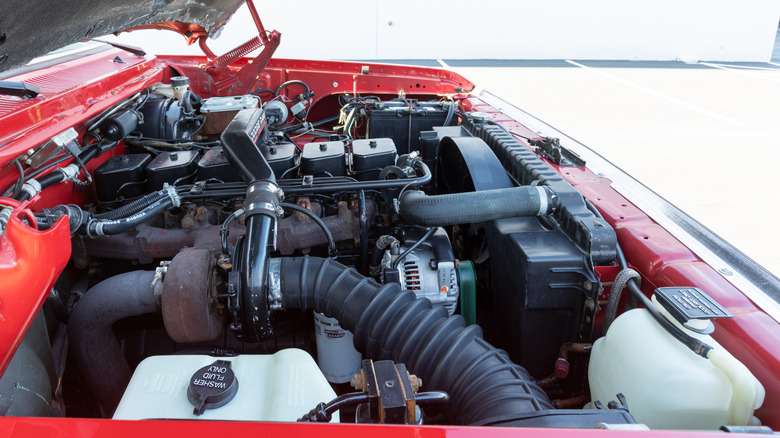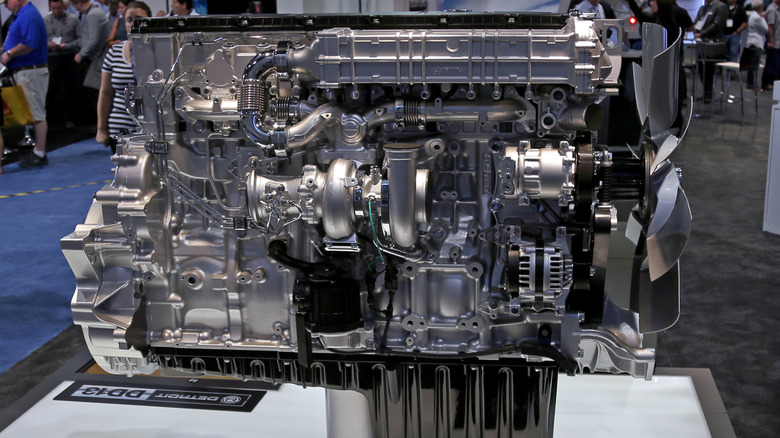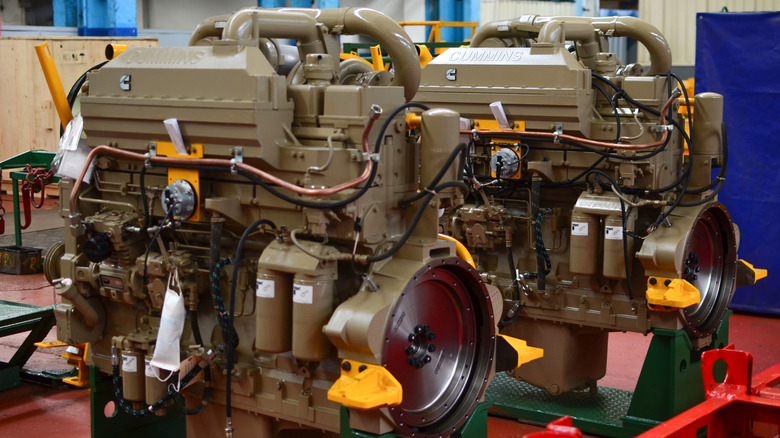Here's The Difference Between Detroit & Cummins Diesel Engines
Diesel engines have undergone several transformations since they debuted in the early 20th century. What started as a reliable power source for industrial machines has evolved into a high-performance option for agriculture equipment and heavy-duty pickup trucks. This evolution is thanks to industry leaders like Volvo, Caterpillar, Kohler Energy, and Cummins Inc., who have consistently pushed the boundaries of what diesel engines can achieve. But as diesel engines became technologically advanced, so did the competition, especially between Detroit and Cummins.
When it comes to the most reliable diesel engines ever built, Detroit and Cummins are among the few companies that you should probably look into. Of course, these two companies have a history of producing a massive range of powerful engines, but their philosophies differ as each brand caters to different priorities.
Detroit, for instance, has a reputation for crafting two-stroke engines that offer high power output and more combustion events per engine cycle — and that's before it shifted to the fuel-efficient four-stroke Series 60, whose production ended in 2011, and the current DD Series. The result? Optimized performance that's ideal for long-distance trucking thanks to high torque and power. On the other hand, Cummins has built its legacy on the four-stroke inline six engine, with models like the ISX series being praised for their rugged build and smooth power delivery across different RPM ranges.
Detroit Diesel engines are ideal for over-the-road trucking and heavy-duty applications
That said, if you usually focus on long-haul trucking, Detroit Diesel engines are often the smarter choice. After all, Detroit focuses primarily on the heavy-duty commercial truck segment, as its DD engine series is built to work in harmony with Freightliner and Western Star trucks.
Take the DD15 that cranks up to 505 horsepower and 1850 lb-ft of torque, for instance. This truck offers impressive amounts of power and also comes with advanced tech features like an integrated engine braking system that improves fuel efficiency and reduces wear and tear during long-distance overhauls. So, if you're focusing on clocking thousands of miles monthly, you'll be sure the engine will deliver durability and efficiency, making it a worthy investment.
If you're tackling varied terrains and hauling demanding loads, the DD16, which is among the most powerful engines Detroit ever made, will push performance even further. With up to 600 horsepower and 2050 lb-ft, this engine is ideal for heavy-duty applications, without compromising Detroit's hallmark emissions compliance. Due to the high-power output, you might think that these engines aren't efficient enough, but in fact, they are synonymous with highway efficiency, thanks to turbo compounding and advanced fuel injection that adapts to your load and terrain.
Cummins Diesel engines are favored for their reliability, versatility, and immense power
Now, if independent serviceability and versatility matter most to you, Cummins engines might be your best option. Unlike Detroit engines, which are built specifically for Freightliner and Western Star trucks, you'll find Cummins engines in a wide range of makes and models. You'll find Cummins diesel engines under the hoods of heavy-duty Ram pickups, Kenworth trucks, and even Peterbilt semis. It's this flexibility that makes Cummins a go-to option for truckers who don't want to be tied to one brand.
In addition to delivering unmatched versatility, Cummins engines are known for producing standout performance and unmatched reliability. The Cummins X15 engine, for instance, redefines heavy-duty demands by providing raw, rugged power with its 605 horsepower and 2050 lb-ft of torque. Plus, it's highly efficient — especially on highway applications — thanks to advanced technologies like predictive cruise control.
Another strong selling point of Cummins diesel engines is that they are designed to remain durable under high-stress conditions. In fact, these engines will thrive easily when it comes to pulling heavy loads across rough terrain and under any climate. They are also easier and more affordable to service. Actually, their widespread use across multiple truck brands and equipment means parts are never hard to find. As a result, this reduces downtime and repair costs.


